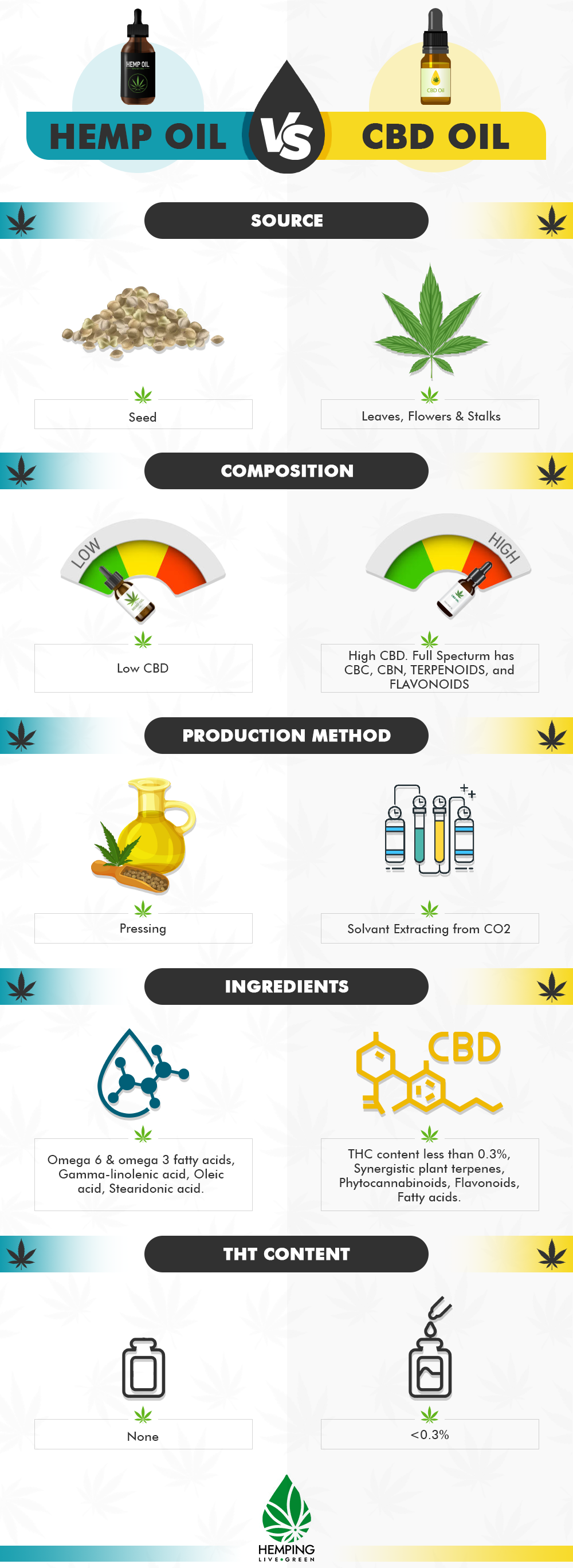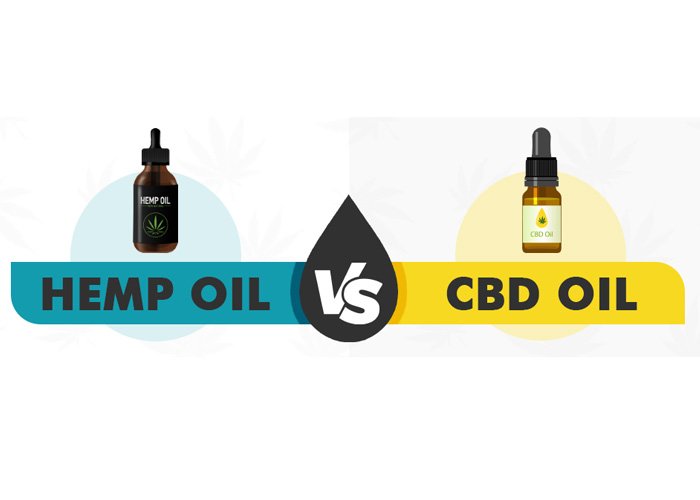
Both hemp seed oil and CBD (cannabidiol) oil are derived from the Cannabis Sativa plant species. While the hemp seed oil is extracted from the seeds of the hemp plant and contains less than 0.3% THC, CBD oil is made from the stalks, leaves, and flowers of both hemp and cannabis plants. Read on to know more about the differences between hemp seed and CBD oil so that you can take an informed decision on which one to use:
1. What is it?
Hemp Oil - Hemp oil extracted from the seeds of the hemp plant delivers a nutty flavor. It constitutes 70-90% polyunsaturated fatty acids, tocopherols, omega-3 essential fatty acids, and linoleic and linolenic acids. Companies producing hemp-seed oil are required to follow stringent guidelines to ensure that the products contain a negligible THC count of 0.3% or less so that it doesn’t trigger psychoactive effects.
CBD Oil - CBD is a non-psychoactive isomer of THC and is one of the amplest active constituents of the cannabis plant. Out of the 100 unique cannabinoids found in hemp, CBD is the second most abundant. It is sourced from the stalks, leaves, and flowers of hemp and cannabis plants and doesn’t result in a high sensation. Given the controversy over the legality of cannabis in some places, most CBD oils are extracted from hemp plants. On being ingested, CBD oil can help our body and brain by interacting with the neurotransmitters and endocannabinoid system impacting our stress response, mood regulation, pain, and inflammation. CBD oil is usually of three types:
- Full spectrum CBD oil containing all compounds of the cannabis plant including a very low level of THC.
- Broad spectrum CBD oil containing various compounds but not THC.
- CBD oil made from CBD isolate containing only CBD.
2. How is it made
Hemp Oil – Hemp seed oil is extracted by cold pressing the seeds of the Cannabis Sativa plant like making olive oil. On extracting the oil, it is stored in a cool and dark place for processing. This oil is rich in vitamins D and B. Since it is derived from the seeds and not the flowers, leaves, or stems, it doesn’t contain THC.
CBD Oil - The CBD oil extraction process often uses carbon dioxide for creating nutrient-dense products rich in cannabinoids. Here the hemp extract is added to a carrier oil with the most popular one being MCT oil made from coconuts. Some other alternatives are almond oil, sunflower oil, vegetable oil, and olive oil. After pairing the carrier oil, next the potency is determined according to the CBD content present. Once the desired potency is reached, additional ingredients might be added according to their intended use.
3. How is it used
Hemp Oil – Often the hemp seed oil is drizzled on vegetables or salad dressings to enhance the flavor of food. You can also consume it as a dietary supplement as the hemp seed oil is rich in polyunsaturated omega-3 and omega-6 fatty acids. Some other industrial uses of hemp oil are varnishes, paints, and other coating materials courtesy of its drying property.
CBD Oil - Products containing CBD oil are widely used as relieving creams, tinctures, or gummies to relieve anxiety and improve sleep. You can also get different beauty products, pet products, and bubbly drinks. Some people use CBD oils for pain, inflammation, epilepsy, addiction management, anxiety, and depression, neurodegenerative conditions, addiction management, etc. Since THC is present in full-spectrum CBD oil, some people might use it for recreational purposes given its psychoactive effects.
4. How does it work
Hemp Oil – Hemp seed oil improves high-density lipoprotein cholesterol, total cholesterol, low-density lipoprotein cholesterol, and triglycerides which come together in improving your cardiovascular health.
CBD Oil – According to researchers, CBD affects our body by enhancing the activity of serotonin receptors, inhibiting endocannabinoid reuptake, and activating the transient receptor which has a big role to play in pain regulation.
5. Benefits
Hemp Oil – The hemp seed oil has a dense nutritional profile including carotene, sulfur, iron, chlorophyll, zinc, potassium, phosphorous, calcium, magnesium, antioxidants like vitamin E, and fatty acids like Omega-3, 6, and 9. The different benefits of hemp seed oil are:
- Providing cardiovascular health benefits
- Relieving constipation
- Improving skin conditions
- Modifying the immune system
- Improving gastrointestinal conditions
Hemp oil also brings various anti-cancer, anti-aging, and antioxidant effects to the table.
CBD Oil – CBD restores our body’s natural balance and works in the endocannabinoid system by activating its core receptors, namely CB1 and CB2 which help regulate our cognitive function, temperature, mood, and muscle repair. Further research is needed in this field but the preliminary studies have revealed that CBD oil can help improve or treat the following areas:
- Psychiatric and neurologic conditions
- Acute and chronic pain
- Epilepsy-related seizures
- Inflammation
- Oxidative stress
- Digestive Health
- Depression, anxiety disorders, and post-traumatic stress disorder
- Weight management
- Cardiovascular conditions like heart disease, hypertension, and stroke.
- Insomnia
- Skin health
- Cancer
6. Regulation
Hemp Oil – The Food and Drug Administration (FDA) doesn’t regulate hemp products and thus they don’t need much reporting.
CBD Oil - All big brands publish third-party Certificates of Analysis and lab reports of their CBD oil products.
7. Restriction on the use
Hemp Oil – Hemp oil is fully devoid of THC and thus there are no laws about it.
CBD Oil - The 2018 Farm Bill made the purchase and sale of CBD oil legal in the United States as long as it is derived from the hemp plant containing either 0.3% or less THC.
8. Risks & side effects
Hemp Oil – The oil’s composition of fats causes the oil to go rancid easily on being exposed to oxygen. It is best consumed raw when fresh and is unsuitable for frying given the relatively low flash point. Ideally, hemp seed oil should be used at temperatures under 300 degrees Fahrenheit and yields the best results when stored in the freezer or refrigerator after opening.
CBD Oil - CBD -derived products have limited side effects. Though conclusive information in this field is lacking, researchers have studied the side effects of its ingredients. According to the Food and Drug Administration (FDA), using CBD in any form tags along with these potential risks:
- Negative drug interactions.
- Potential liver injury.
- Gastrointestinal diseases like decreased appetite or diarrhea.
- Change in alertness level.
- Increased drowsiness when used with drugs or alcohol.
- Changes in the mood like increased agitation and irritability.
Conclusion
The benefits derived from the Cannabis sativa plant vary according to the type of plant and which part of the plant is used. If you are trying to increase your omega intake and boost your physical health, hemp seed oil can serve as your best bet. Alternatively, if you need help with anxiety or depression and need pain relief, then you can consult your healthcare provider on whether CBD oil can be the right choice for your health needs.

